New genetic test for pancreatic cancer outperforms current guidelines

A molecular test called PancreaSeq accurately classifies pancreatic cysts as potentially cancerous or benign, according to a large, multi-center study led by University of Pittsburgh School of Medicine and UPMC researchers.
Published today in Gastroenterology, the prospective study of more than 1,800 patients found that incorporating molecular markers improved the accuracy of diagnoses compared with current guidelines based on imaging of cysts.
"Based on the results of this study, molecular testing of pancreatic cysts is poised to enter international consensus guidelines for the diagnosis of pancreatic cysts and early detection of pancreatic cancer," said co-senior author Aatur Singhi, M.D., Ph.D., associate professor of pathology at Pitt and UPMC Hillman Cancer Center investigator. "Our hope is that PancreaSeq will not only improve early detection of pancreatic cancer but also avoid overtreatment and unnecessary surgery of non-cancerous cysts."
Up to 15% of the U.S. population will develop a pancreatic cyst at some point in their lives. Most of these cysts are benign, but a small fraction will transform into cancer.
"Although rare, pancreatic cancer is a deadly disease: Most patients will die within a few years of diagnosis," said Singhi. "The only way we can improve outcomes for pancreatic cancer is to find better treatments or detect it earlier. Here at UPMC, our focus has been addressing both of these issues, and especially improving early-stage detection efforts."
Pitt developed PancreaSeq, which accurately distinguishes benign cysts from those that could become cancerous by sequencing 22 pancreatic cyst-associated genes.
To capture the true population of pancreatic cyst patients and confirm that PancreaSeq can be applied in a clinical setting, the new multi-center study included 1,832 patients from 31 institutions. Using a prospective study design, the researchers analyzed molecular markers in pancreatic cyst fluid collected from patients and followed their outcomes for two years.
Pancreatic cysts can be broadly categorized as non-mucinous, which are benign, and mucinous, which have the potential to give rise to pancreatic cancer.
Based on mutations in genes called KRAS and GNAS, PancreaSeq diagnosed mucinous cysts accurately in 90% of cases, making it a highly sensitive test. It did not identify any false positives, meaning that it had a specificity of 100%.
"There is a very low likelihood of mucinous cysts giving rise to cancer, but accurately identifying this type of cyst is important because it gives us a window of opportunity to monitor patients and prevent pancreatic cancer from developing," said Singhi.
Among mucinous cysts, the test accurately identified those that had advanced to cancer in 88% of cases and with a specificity of 98%. When the researchers included another type of analysis—evaluation of cells under the microscope for cancer-associated changes—the test sensitivity improved to 93% and specificity remained high at 95%.
The test also performed well in detecting non-mucinous cysts and another type of lesion called pancreatic neuroendocrine tumors. Also known as PanNETs, these tumors are usually benign, but can be lethal if they metastasize to other parts of the body.
"This study lays the foundation for developing prognostic biosignatures for PanNETs so that we can identify which tumors will metastasize and which won't," said Singhi.
Current guidelines for assessing whether a pancreatic cyst is cancerous mostly rely on imaging of features such as size and growth rate. The researchers found that PancreaSeq distinguished different types of cysts with higher accuracy than traditional forms of surveillance and current pancreatic cyst guidelines.
According to Singhi, the findings from this study will inform international consensus guidelines for treatment of pancreatic cysts, adding molecular testing to forthcoming updated recommendations.
"This test developed at UPMC is going to make a big difference in how we classify and manage patients moving forward," said Singhi. "Our hope is that PancreaSeq prevents overtreatment but at the same time doesn't miss pancreatic cancer."
An expanded version of PancreaSeq that includes a broader array of biomarkers is now available to patients both within the U.S. and internationally. Samples are collected at local centers and are sent to UPMC for testing and analysis. The researchers are now applying for broad insurance coverage, which they hope to have approved by the end of the year.
More information: Aatur Singhi et al, Prospective, Multi-Institutional, Real-Time Next-Generation Sequencing of Pancreatic Cyst Fluid Reveals Diverse Genomic Alterations that Improve the Clinical Management of Pancreatic Cysts, Gastroenterology (2022). www.gastrojournal.org/article/ … (22)01086-1/fulltext
















